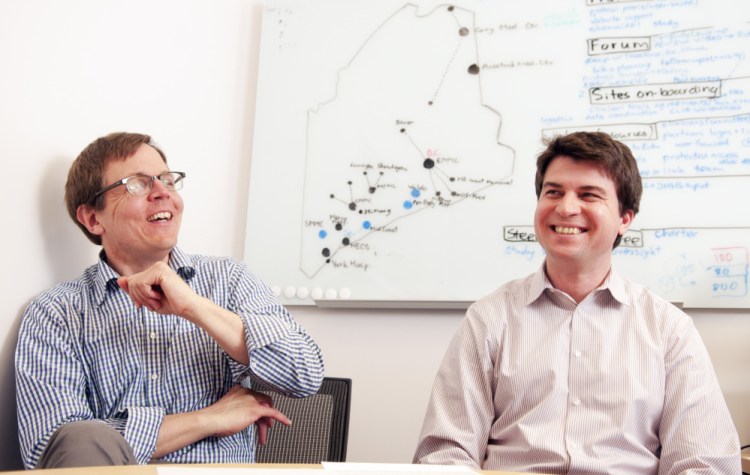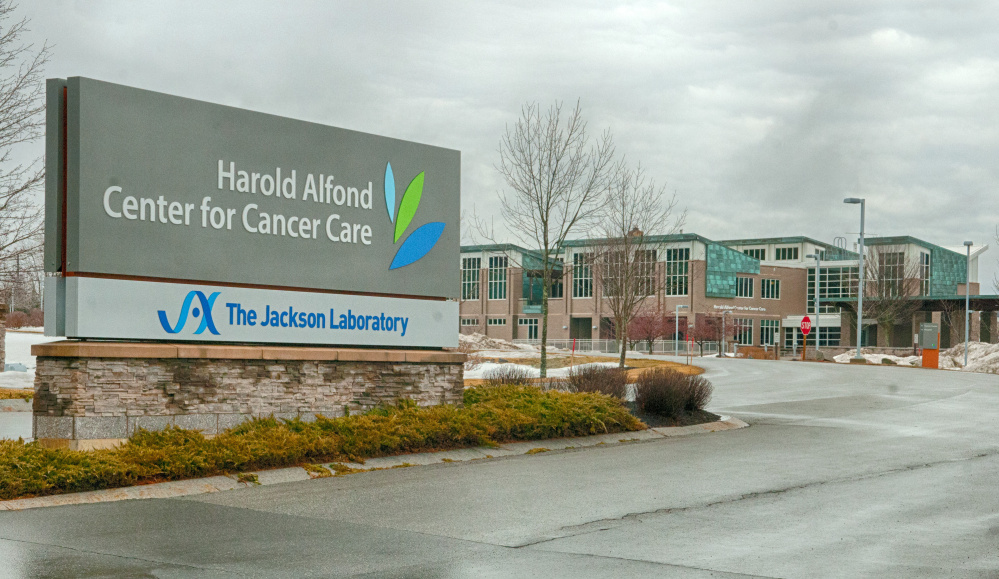AUGUSTA — A new sign in front of MaineGeneral’s Harold Alfond Center for Cancer Care on Old Belgrade Road identifies the center as a home base for genetic technology researchers with The Jackson Laboratory.
The outpatient treatment center, which has been operating for almost a decade, is now the home of the Maine Cancer Center Genomics Initiative, led by program Director Andrey Antov and medical Director Dr. Jens Rueter.
That arrangement means oncologists throughout the state will be able to share in new technology and information to better design treatment for patients.
The initiative is a result of an $8.4 million donation to The Jackson Laboratory by the Harold Alfond Foundation to enhance cancer diagnostics and treatment in Maine. The Jackson Laboratory, a Bar-Harbor based nonprofit biomedical research institution, is matching the Alfond donation. The lab also operates a cancer research center in Sacramento, California, and a genomic medicine institute in Farmington, Connecticut.
“Our goal is to create a network of oncology professionals in the state of Maine to provide genomic education so it can be applied successfully in the practice,” Antov said. “The technology that is utilized for clinical genomics is only five or six years old, so therefore education on that technology is critical for the clinical community.”

The Jackson Laboratory’s name has been added to the sign at the Harold Alfond Center for Cancer Care in Augusta.
Antov and Rueter have spent the past six months traveling across the state to meet with oncology health care professionals, setting up a clinical steering committee and beginning to form genomic tumor boards that offer collaboration and education in new technology. It will use Web-based technology to connect the various oncology practices across the state.
“We are working through the doctors by actually empowering them to actually apply an understanding of the new technology rather than come from a different perspective and enroll them in a study,” Antov said. He added that the initiative puts Maine in a spotlight.
Rueter brings the clinical perspective as well, writing the research protocol because he worked previously at Eastern Maine Medical Center Cancer Care of Maine and knows the Maine oncology community.
“They’ve all been really excited about it,” Rueter said. “We’re coming in and offering technology and expertise in technology, educating around it and saying, ‘Let’s find out together how it’s best used.’ ”
Rueter added that Jackson Lab “is saying we have some understanding of this particular subject matter, which is genomics, and we’ll work with you in helping you figure out how you can best use it.”
Through the genomic tumor boards in Maine, specialists should be able to share what has gone awry in the DNA code in a particular person and how the cancer treatment medication can be tailored by the oncologist to help that person.
Rueter said feedback received by the initiative will help “make it better for the community over time.” It could also lead to bringing clinical trials here.
“What we’re trying to do is design a different health care model,” Rueter said.
The donations will fund the initiative for three and a half years. The research and education do not involve having any of The Jackson Laboratory’s strains of research laboratory mice on site.
While everyone benefits, the Harold Alfond Center for Cancer Care gets an additional level because it provides opportunity for more direct communication with the clinical oncologists. “Physical proximity still means something, even in this day and age of remote communication tools,” Rueter said.
“It was important for us to be in a cancer center,” Antov said, adding that the Augusta center was a natural choice based on the funding source and the location.
“Having the technology and expertise of a world-renowned biomedical research institution like the Jackson Laboratory is a great opportunity for the oncologists and other practitioners here at MaineGeneral Medical Center,” said Dr. G. Richard Polkinghorn, medical director of the Alfond Center for Cancer Care. “We will have more tools to help us work with our patients on treatment plans. We’re excited to be able to bring this expanded education to our team of providers and, ultimately, to improve treatment and outcomes for our patients.”
In 2015, the Harold Alfond Center for Cancer Care treated 1,126 newly diagnosed people, almost evenly divided between males and females, and in all about 7,000 people annually.
Cancers of the respiratory and digestive systems and breast cancers were those most commonly treated.
Betty Adams can be contacted at 621-5631 or at:
badams@centralmaine.com
Twitter: betadams
Send questions/comments to the editors.




